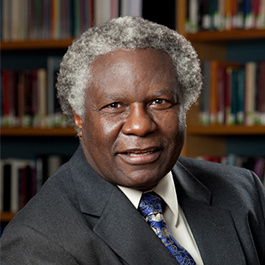
The United Nations Environment Programme (UNEP) is responsible for coordinating responses to environmental issues within the United Nations system. It was established by Maurice Strong, its first director, after the United Nations Conference on the Human Environment in Stockholm in June 1972. Its mandate is to provide leadership, deliver science and develop solutions on a wide range of issues, including climate change, the management of marine and terrestrial ecosystems, and green economic development. The organization also develops international environmental agreements; publishes and promotes environmental science and helps national governments achieve environmental targets.

The United Nations Institute for Training and Research (UNITAR) is a dedicated training arm of the United Nations system. UNITAR provides training and capacity development activities to assist mainly developing countries with special attention to Least Developed Countries (LDCs), Small Island Developing States (SIDS) and other groups and communities who are most vulnerable, including those in conflict situations.

Calestous Juma was a Kenyan scientist and academic, specializing in sustainable development. He was named one of the most influential 100 Africans in 2012, 2013 and 2014 by the New African magazine. He was Professor of the Practice of International Development and Faculty Chair of the Innovation for Economic Development Executive Program at Harvard Kennedy School. Juma was Director of the School's Science, Technology and Globalization Project at Harvard Kennedy School as well as the Agricultural Innovation in Africa Project funded by the Bill and Melinda Gates Foundation.
The UN Environment Programme World Conservation Monitoring Centre (UNEP-WCMC) is the specialist biodiversity centre of UN Environment Programme, based in Cambridge in the United Kingdom. UNEP-WCMC has been part of UN Environment Programme since 2000 and has responsibility for biodiversity assessment and support to policy development and implementation. The "World Conservation Monitoring Centre" was previously an independent organisation jointly managed by IUCN, UN Environment Programme and WWF established in 1988. Prior to that, the centre was a part of the IUCN Secretariat.
The United Nations Office at Nairobi in Nairobi, the capital of Kenya, is one of four major United Nations office sites where numerous different UN agencies have a joint presence. Established in 1996, it is the UN's official headquarters in Africa.
An environmental emergency is defined as a "sudden-onset disaster or accident resulting from natural, technological or human-induced factors, or a combination of these, that causes or threatens to cause severe environmental damage as well as loss of human lives and property."
Proposals for the creation of a United Nations Environmental Organization (UNEO) have come as some question the efficacy of the current United Nations Environment Programme (UNEP) at dealing with the scope of global environmental issues. Created to act as an anchor institution in the system of Global Environmental Governance (GEG), it has failed to meet those demands. The UNEP has been hindered by its title as a Programme as opposed to a specialized agency like the United Nations Educational, Scientific and Cultural Organization (UNESCO) or the World Health Organization (WHO), in addition to a lack of voluntary funding, and a location removed from the centers of political power, in Nairobi, Kenya. These factors have led to widespread calls for UNEP reform, and following the publication of Fourth Assessment Report of the IPCC in February 2007, a "Paris Call for Action" read out by French President Chirac and supported by 46 countries, called for the UNEP to be replaced by a new and more powerful United Nations Environment Organization, to be modelled on the World Health Organization. The 52 countries included the European Union nations, but notably did not include the United States and BRIC, the top five emitters of greenhouse gases.
The International Assessment of Agricultural Knowledge, Science and Technology for Development (IAASTD) was a three-year international collaborative effort (2005–2007) initiated by the World Bank in 2002, which evaluated the relevance, quality and effectiveness of agricultural knowledge, science, and technology, and the effectiveness of public and private sector policies and institutional arrangements.
Nii Allotey Odunton, a mining engineer from Ghana, was the Secretary-General of the International Seabed Authority, serving consecutive four-year terms starting in 2009 and ending in 2017.
The Regional Center for Renewable Energy and Energy Efficiency (RCREEE) is an intergovernmental organization with diplomatic status that aims to enable and increase the adoption of renewable energy and energy efficiency practices in the Arab region. RCREEE teams with regional governments and global organizations to initiate and lead clean energy policy dialogues, strategies, technologies and capacity development in order to increase Arab states' share of tomorrow's energy.

Rajendra Madhavrao Shende, an alumnus of Indian Institute of Technology (IIT) and former Director in United Nations Environment Programme (UNEP), is currently serving as the Founder Director of Green TERRE Foundation. which is a not-for-profit organization working towards global goals of NetZero, Carbon Neutrality, Climate Change, Global Warming and Environment, as per various protocols of United Nations' sustainable development goals (SDGs). He is the Ideator and Director of Smart Campus Cloud Network (SCCN) which is a network of global universities which have pledged to make their campuses carbon neutral by achieving NetZero targets. This program has been widely acclaimed as innovative and practical solution which offers the students hands-on experience and expertise in NetZero and Carbon Neutrality. He previously held the position as Chairman of TERRE Policy Centre which is a not-for-profit organization engaged in the policy development and project based advocacy on the sustainable development. Before August 2011, he was the Head of the OzonAction Branch of the United Nations Environment Programme, Division of the Technology, Industry and Economics in Paris.

OzonAction is a branch of the United Nations Environment Programme (UNEP) which has its main office in Paris, and is part of UNEP's Division of Technology, Industry and Economics (DTIE). Created in 1991, today it has staff located in five regional offices of UNEP, namely in Africa, Asia & the Pacific, Latin America and the Caribbean, and West Asia.
United Nations System-wide Earthwatch is an initiative set up by the United Nations to bring together environmental observations by UN agencies within a consistent framework.

The Nairobi Convention is a partnership between governments, civil society and the private sector, working towards a prosperous Western Indian Ocean Region with healthy rivers, coasts and oceans. It pursues this vision by providing a mechanism for regional cooperation, coordination and collaborative actions; it enables the Contracting Parties to harness resources and expertise from a wide range of stakeholders and interest groups; and in this way it helps solve inter-linked problems of the region's coastal and marine environment.

The Global Universities Partnership on Environment for Sustainability (GUPES) is a United Nations Environment Program (UNEP) flagship programme, hosted by the Environmental Education and Training Unit (EETU), at the UNEP Headquarters in Nairobi, Kenya. The partnership seeks to increase active environmental commitment and action with higher education institutions and policy institutions globally.
Professor Reuben James Olembo (1937–2005) was a prominent Kenyan academic, scientist and environmentalist. He was a deputy executive director of the United Nations Environment Programme (UNEP), which he played a pivotal role in helping found, and United Nations Assistant Secretary General from 1994 to 1998. He became the Acting Secretary General of the Convention on International Trade in Endangered Species of Wild Fauna and Flora (CITES), after his retirement from UNEP.
The Global Peatlands Initiative is an effort made by leading experts and institutions formed in 2016 by 13 founding members at the UNFCCC COP in Marrakech, Morocco. The mission of the Initiative is to protect and conserve peatlands as the world's largest terrestrial organic carbon stock and to prevent it from being emitted into the atmosphere.
Adnan Z. Amin is a Kenyan diplomat and a development economist with a specialty in sustainable development. He served as the first Director-General of the Abu Dhabi–based intergovernmental organisation, the International Renewable Energy Agency (IRENA). Amin was elected in April 2011, having previously served as the Agency's Interim Director-General in 2010. Prior to his appointment at the IRENA, he worked in a variety of senior positions within the United Nations system in areas relating to in renewable energy, sustainable development and environmental policy. He served as the Director of the New York Office of United Nations Environment Programme (UNEP) and Special Representative of the UNEP Executive Director.

Elizabeth Maruma Mrema is a Tanzanian biodiversity leader and lawyer, living in Montreal, Canada, who has been serving as Deputy Executive Director of the United Nations Environment Programme (UNEP) since 2023, under the leadership of Executive Director Inger Andersen.








